1. Goal Setting:
- Set clear and achievable goals. Both short-term and long-term objectives provide direction and motivation for athletes.
2. Visualization:
- Practice mental imagery by vividly visualizing successful performances. This can boost confidence and help athletes mentally prepare.
3. Positive Self-Talk:
- Replace negative self-talk with positive affirmations. Encourage self-belief and maintain a constructive inner dialogue.
4. Focus on the Process:
- Concentrate on the task at hand, not just the outcome. Focusing on the process helps reduce anxiety and keeps athletes in the present moment.
5. Mindfulness and Relaxation Techniques:
- Use mindfulness and relaxation exercises to manage stress and anxiety. Techniques like deep breathing and progressive muscle relaxation can be beneficial.
6. Pre-Performance Routine:
- Establish a pre-performance routine that includes physical warm-ups and mental preparations. Consistency in routines can enhance mental readiness.
7. Resilience Training:
- Develop resilience to handle setbacks and failures. Resilient athletes bounce back from challenges and maintain motivation.
8. Stay Confident:
- Cultivate self-confidence by focusing on past successes and recognizing personal growth and improvements.
9. Focus on Controllables:
- Concentrate on factors within your control, like effort, attitude, and preparation. This reduces stress about external variables.
10. Performance Journal:
- Maintain a performance journal to track your mental and emotional state during training and competitions. This can provide insights and help refine your mental game.
11. Stay in the Present:
- Avoid dwelling on past mistakes or worrying about the future. Stay in the present to make the most of each moment.
12. Routine Visualization:
- Incorporate routine visualization into your practice. Visualize your performance in training and competitions to enhance familiarity and comfort.
13. Team Cohesion:
- Foster a supportive team environment. Strong team cohesion can reduce pressure and enhance motivation.
14. Learn from Failure:
- Treat failures as opportunities to learn and grow. Use setbacks as stepping stones to future success.
15. Mindful Competition:
- Approach competition with mindfulness. Be fully present, react to situations as they unfold, and adapt your strategies as needed.
16. Seek Professional Guidance:
- Consider working with a sports psychologist or mental coach. These professionals can provide tailored strategies to enhance your mental game.
17. Positive Imagery:
- Create a library of positive imagery to draw upon during challenging moments. Recall your best performances to boost confidence.
18. Post-Game Evaluation:
- After competitions, evaluate your performance objectively. Identify areas for improvement without dwelling on mistakes.
The mental game is an integral part of athletic success. By incorporating these strategies into their training and competition routines, athletes can enhance their mental strength, confidence, and overall performance. A strong mental game not only improves physical skills but also helps athletes navigate the challenges and pressures of sports with poise and resilience.




Comments (0)